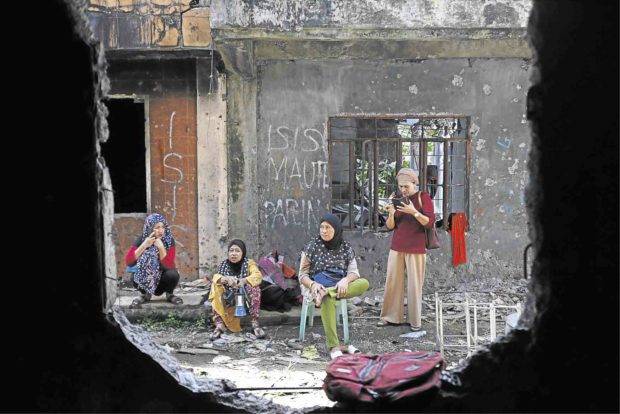Displaced Marawi residents need money for milk, supplies that are not part of aid

TEMPORARY RETURN Some residents of Marawi City, like these women, were allowed to return to their homes in ground zero to retrieve valuables. —JEOFFREY MAITEM
MARAWI CITY—As soon as Nassif Benasing opened two boxes of relief goods that his family got from a nongovernment organization, he immediately offered them for sale—even to reporters covering the relief distribution in the village of Bito Buadi Itowa here on Wednesday.
As his wife, Almairah, held their 3-week-old son—the couple’s 15th child—Benasing, in his 40s, begged reporters to buy some of the items he had just received.
“I am selling half of this so I can buy milk for my youngest,” he said inside his family’s tent.
“I don’t have any means of raising money,” he said.
Benasing said he did not have any job and though selling part of what was given his family was painful, he had to do it.
Article continues after this advertisement“I need to provide what my youngest needs,” he said, adding that his wife could not breastfeed the baby as she was not lactating.
Article continues after this advertisementRamadan aid
Benasing’s family was among 7,000 families who received Ramadan food packs from Islamic Relief Philippines (IRP) on Wednesday.
Each family got food packs depending on the number of dependents.
Others, like Benasing’s, got two boxes each containing 15 kilograms of rice, 500 grams of halal-certified salt, 500 g of halal-certified mongo beans, 2 liters of cooking oil, three cans of halal-certified sardines and three cans of halal-certified corned beef.
Benasing recounted that life was good before the war broke out here on May 23 last year.
He worked in a construction company in Manila with his two elder children and sent home their earnings.
When the war broke out, Benasing said he hurriedly left Manila fearing for the safety of his family in the village of Marinaut.
Marinaut was one of 24 villages that remained no man’s land until now after they were tagged as ground zero of the fighting from May 23 to Oct. 17 last year between government forces and Islamic State gunmen.
Flight
Benasing came home only to find that his family had already fled to Malabang, a town in Lanao del Sur.
After months of living in the Malabang evacuation center, he decided to move to Bito Buadi Itowa, where the government had put up tents for displaced Marawi residents.
Some needs can’t be provided by relief agencies, though. The money that his eldest son, who works as a sales clerk in a mobile phone shop in Manila, continued to send was insufficient.
Leah Bugtay, IRP program coordinator, said the aid that her group provided was just for families to have meals during “suhoor,” or early morning mealtime, and food to break fasting during Ramadan.
The objective, Bugtay said, was for families to “concentrate on their prayers and worry less about food.”
Lack of money has been hounding many evacuees who could not find work for many reasons, including lack of skills or simply lack of jobs.
No money for water
Dayamon Cosain, former resident of the village of Raya Madaya 1 who has found shelter in the village of Sagonsongan, said the displaced did not have money to buy water when the taps went dry.
Another resident, Salam Paraiman, complained about the same problem.
She said she’s stuck in the shelter and could not search for funds because she could not pay for transportation.
As classes were set to resume, her next problem was how her children can go to school without money for fare.
Last week, some 15,000 families had been given prepaid bank cards. But these did not have cash yet.
The cards were just in preparation for future aid.
Rohaina Magarang, a mother of four who used to run a small retail store in the village of Moncado Colony, said she had been waiting for the government to deliver its promise to distribute financial aid.
She said she wanted to restart her store, which helped send her children to school.
Aminoden Manalondong, a father of three, said he continued what he used to do before the war—repack charcoal and sell these to his neighbors.
But Manalondong said the income was barely enough. —DIVINA SUSON